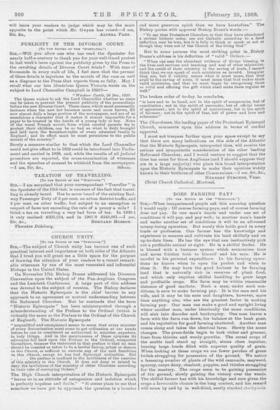CHURCH UNITY.
[TO TRH EDITOR OF 'RR " SPICOTATOR.1
Sin,—The subject of Church unity has become one of such practical interest and importance on both sides of the Atlantic that I trust you will grant me a little space for the purpose of drawing the attention of your readers to a recent remark-
able utterance by one of the most venerated and influential Bishops in the United States.
On November 17th Bishop Doane addressed his Diocesan Convention upon the subject of the Pan-Anglican Congress and the Lambeth Conference. A large part of this address was devoted to the subject of reunion. The Bishop declares that the Historic Episcopate is the chief barrier to any
approach to an agreement or mutual understanding between the Reformed Churches. But he contends that the term "Historic Episcopate" has been misinterpreted through a misunderstanding of the Preface to the Ordinal (which is virtually the same as the Preface to the Ordinal of the Church of England). The Historic Episcopate "unqualified and unexplained seems to mean that every minister of every denomination must come to got ordination at our hands before he can be considered as authorized to minister, anywhere, in holy things. And in the maintenance of these opinions its advocates fall back upon the Preface to the Ordinal, misquoted threadbare, because the statement in that preface is that no man should be counted or taken to be a lawful bishop, priest or deacon in this Church, or suffered to execute any of the said functions in this Church, except he has had Episcopal ordination. But the preface is confined to the lawfulness of the exercise of this ministry in this Church. It does not deny or intend to deny the lawfulness of the ministry of other Churches according to their rule of convoying Orders."
The High Church interpretation of the Historic Episcopate "leaves us in an attitude of antagonism and isolation which is perfectly hopeless and futile." " It seems plain to me that somehow we have got to approach the question in a broader and more generous spirit than we have heretofore." The Bishop quotes with approval Bishop Brent's words :—
" To say that Protestant Churches, in that they have abandoned a certain historic order, are not Catholic according to a fixed definition may be true, but it is folly to think or speak or act as though they were not of the Church of the living God."
But to some persons the most striking point in Bishop Doane's address is his definition of " valid " Orders :—
" When one sees the abundant evidence of divine blessing in the lives and services and teaching and zeal of other ministries, and the result of their ministry in the saving of souls, I cannot i
think that we can speak of such ministries as invalid. Irregular they are, but if validity means what it must mean, that they avail to the saving of souls, it must mean that God makes them valid ministries, and that we must begin by recognising them as valid and offering the gift which shall make them regular as well."
The broken order of to-day, he concludes,
"is here and to be faced, not in the spirit of compromise, but of conciliation; not in the spirit of surrender, but of official terms of agreement ; not in the spirit of controversy, but in the spirit of fairness ; not in the spirit of fear, but of power and love and soberness."
The Churchman, the leading paper of the Protestant Episcopal Church, comments upon this address in terms of cordial approval.
I must not trespass further upon your space except to say that there are many indications on this side of the Atlantic that the Historic Episcopate, interpreted thus, will receive the serious and sympathetic consideration of the other leading Reformed Churches; and I would venture to suggest that the time has come for those Anglicans (and I should suppose they are in a largo majority) who place this broad interpretation upon the Historic Episcopate to make their opinions widely known to their brethren of other Communions.—I am, Sir, &C., HERBERT SYMONDS, Vicar. Christ Church Cathedral, .11fontreal.










































 Previous page
Previous page